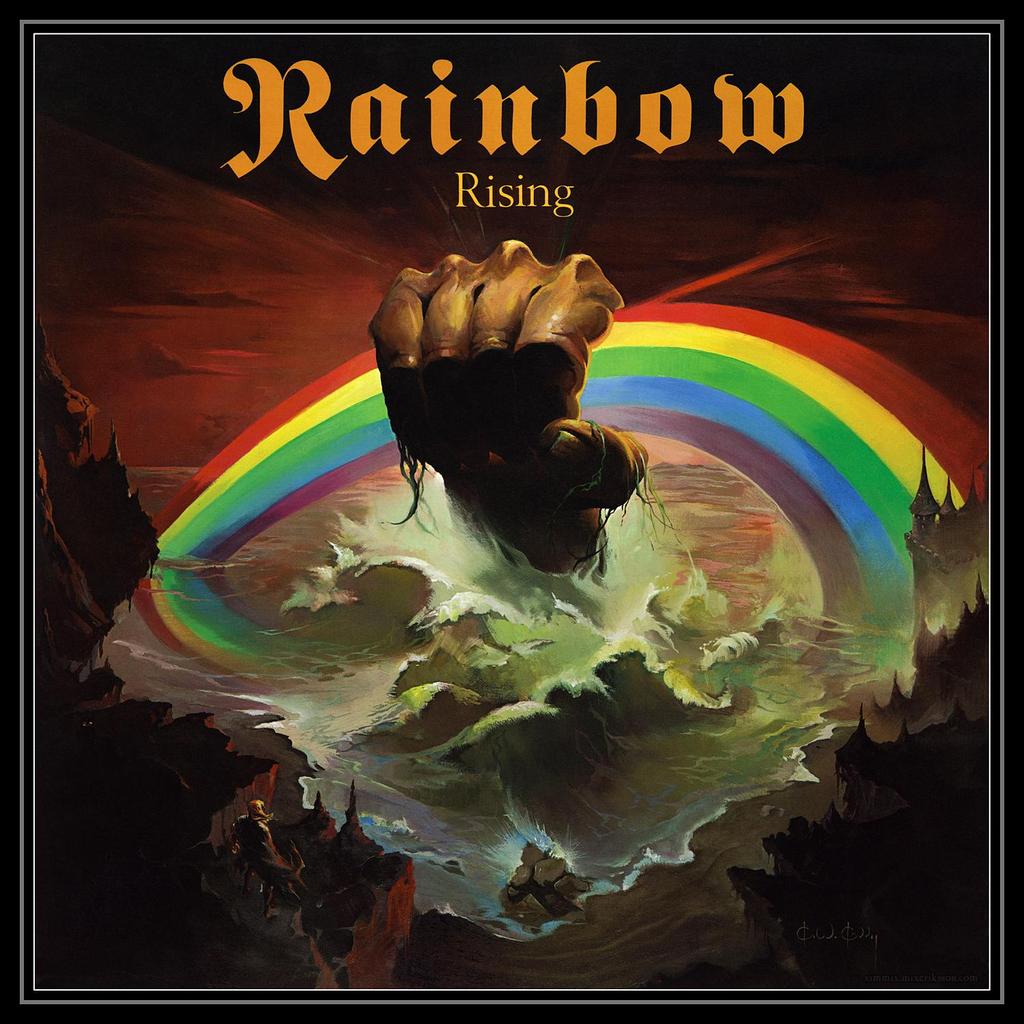The haziness of music history shows that Rainbow were one of the first acts to actually identify themselves as Heavy Metal. While it may have been Jimi Hendrix’ guitar playing that had been described as ‘heavy metal falling for the sky’, and the trio of Led Zeppelin, Deep Purple and Black Sabbath started out as super-amplified blues, super-amplified jam-rock and super-amplified slow-riffing madness respectively, it took a few years of rising levels of hearing damage among the youth population before acts aspired to be this thing that what rather nebulously being called Heavy Metal. Formed by former Deep Purple guitar-slinger, professional moody-chops and black velvet enthusiast Ritchie Blackmore, Rainbow were initially little more than a pseudonym for Blackmore’s solo project, upon which he could have sole creative control. Having recruited regular Deep Purple support act Elf, ruthlessly ditching their guitar player, and calling the result Ritchie Blackmore’s Rainbow, the resulting album of the same name sold well enough for Blackmore and Elf frontman Ronnie James Dio to realise that there was a real future in their collaboration, and by reducing the band’s name to simply ‘Rainbow’, it gave the impression of a cohesive musical unit, instead of it being a name for Ritchie Blackmore and a constantly revolving cast of musicians. Ironically, despite these modifications, this is exactly what Rainbow would eventually become.
Unity was always a problem for Rainbow. Following the release of their debut, Blackmore had dismissed all former members of Elf except Dio, and started aggressively recruiting a new line up which included future hard-rock drummer for hire Cozy Powell, keyboard player Tony Carey, and bass player Jimmy Bain. It was this line up that recorded Rainbow’s second album, Rising, a majestic statement of Heavy Metal grandeur propelled by Blackmore’s proto-shredding, Dio’s non-more metal vocals, Powell’s relentless drum wallop and Carey’s sophisticated keyboards. Bain, by contrast, is seemingly a background player in this treble-high recording that seems almost mixed for radio.
The thing is, while Rainbow may have been publicly perceived as Blackmore’s band, it was the diminutive Dio who created the blueprint for so many Heavy Metal acts that would follow, from the devil horn salute, to the sword and sourcery indebted lyrics, to the unholy vocal screech. These may all have become Heavy Metal clichés subsequently, but they’re all part of the culture thanks in no small part to the contribution of Ronnie James Dio, and those later albums after he moved on to other things are a very different beast because of his absence.
Rising is perhaps the definitive Heavy Metal statement by Rainbow. While 1977’s On Stage And 1978’s Long Live Rock ‘n’ Roll have their fans, it is the fact that Rising was the moment that Rainbow truly discovered their calling that cements it as a classic of the genre. From the use of the Munich Philharmonic Orchestra on the glorious career-high that was “Stargazer”, to the fantasy epic artwork, the whole package screams ‘Heavy Metal classic’. It’s not just a one-song album either, as “Tarot Woman” is a thrilling opener, “Starstruck” shows they could give their songs a commercial edge when it was required and “A Light in the Black” gamely attempts to match “Stargazer” in the prog-metal stakes. Both Dio and Blackmore were at their top of their respective games as writers and performers, Powell was his usual dependably brilliant self, and Carey and Bain were no slouches either. Not that Blackmore agreed. Both of them were gone by the next Rainbow album, and by 1978 Dio would have walked away too, allowing Blackmore to re-shape Rainbow as a much more commercial mainstream rock beast.
Regardless of Rainbow’s later slide towards mediocrity, Rising remains a great album, and a Heavy Metal monument to one of the true icons of the genre. While Ritchie Blackmore has long since been established in pop music folklore, Rising is as much, if not more, Ronnie James Dio’s success. Heavy Metal would have been really very different without him.














No Comment